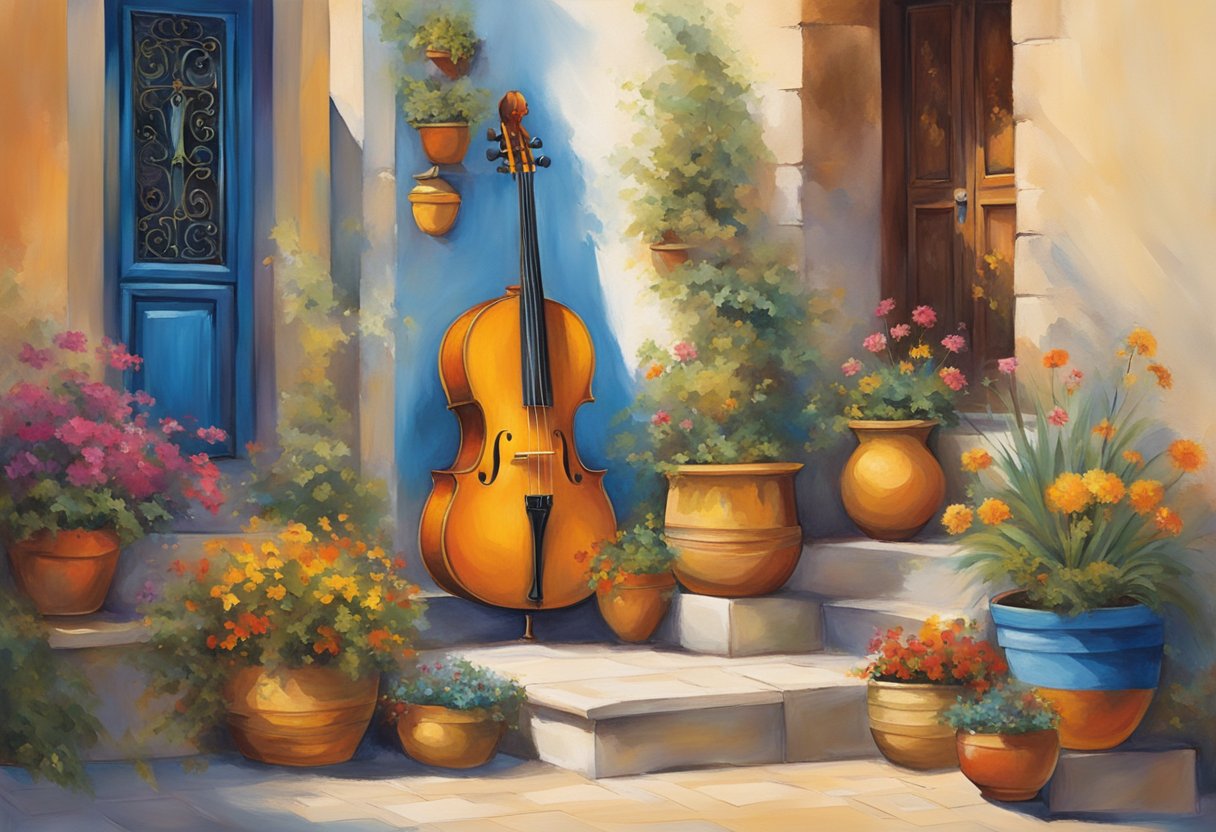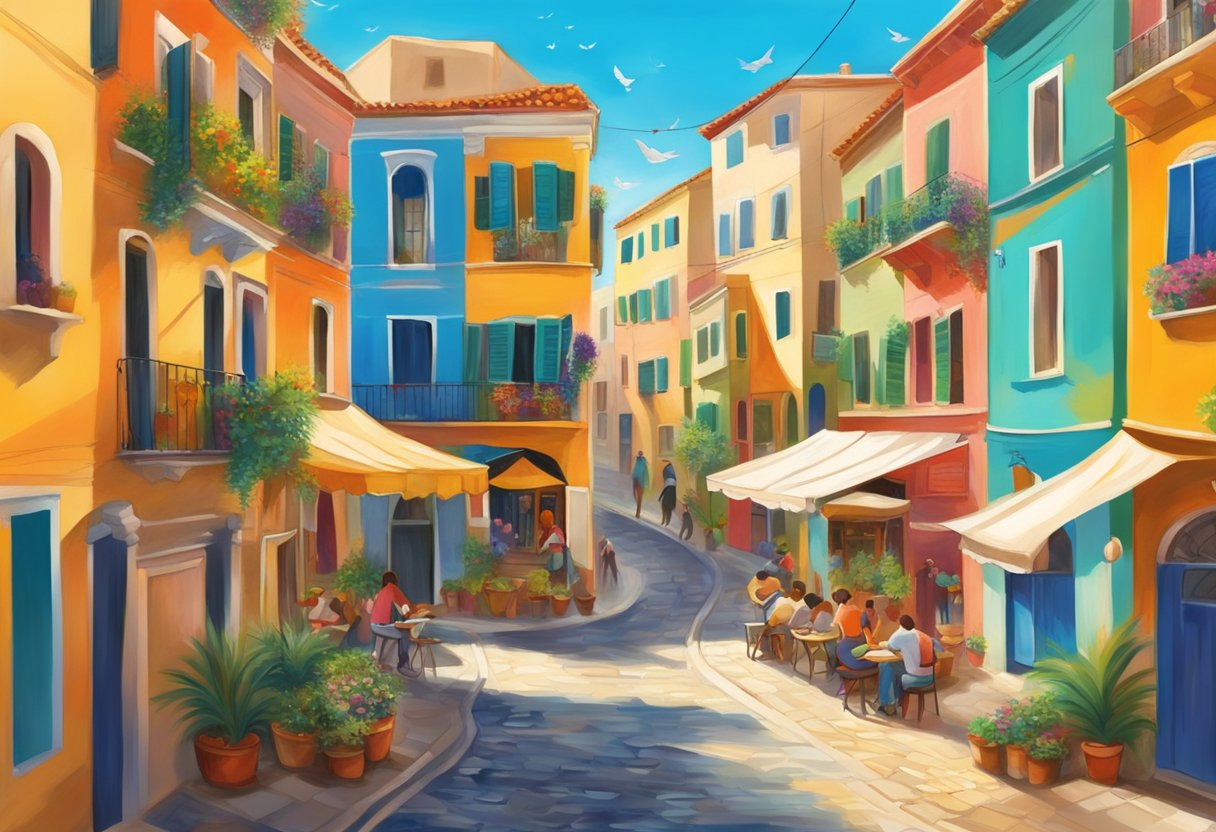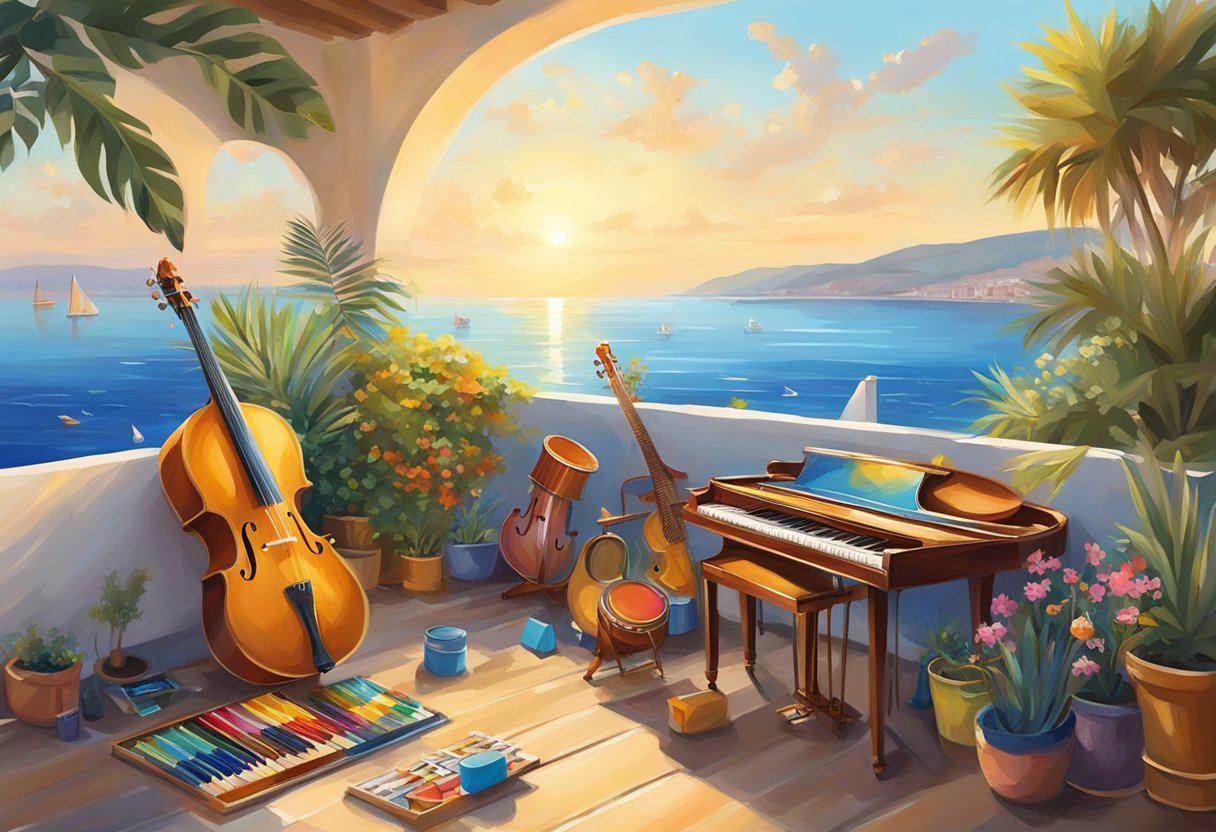The Mediterranean region has long been revered for its vibrant culture, which is deeply rooted in the arts and music. These elements are not just forms of entertainment but are integral to the region’s way of life, reflecting a history rich in diversity and human expression. The arts and music, interwoven with the everyday experiences of those who live there, contribute significantly to the Mediterranean’s unique ambiance, underscoring identity and way of community life. Enhanced quality of life and well-being are often highlighted when discussing the Mediterranean lifestyle, which is influenced not only by dietary habits but also by the region’s strong cultural traditions in art and music.

Exploring the relevance of art and music in the Mediterranean lifestyle offers insights into how these cultural components shape well-being and social cohesion. Research into these areas frequently uncovers connections between engaging with the arts, participating in musical activities, and reported increases in happiness and psychological richness. These cultural practices support cognitive development, emotional expression, social skills, and overall health. As the Mediterranean remains a prime example of how daily exposure to art and music contributes to a holistic sense of well-being, it becomes clear that these elements are more than mere pastimes; they are vital aspects of a fulfilling life.
Key Takeaways
- Art and music are intrinsic to the Mediterranean way of life, contributing to its distinct culture and well-being.
- Engagement in these cultural practices supports emotional balance and social connectivity, enhancing overall health.
- Exposure to art and music within the Mediterranean lifestyle is linked with improved psychological richness and quality of life.
Table of Contents
The Historical Context of Art and Music in the Mediterranean
Art and music have been integral to the cultural fabric of the Mediterranean region, reflecting its rich history and diversity. They not only provided aesthetic pleasure but also contributed to the well-being of its societies.
Cultural Legacy and Diversification
The Mediterranean basin has long been a melting pot of cultures and traditions, leading to a broad diversification in both artistic expression and musical forms. Historical records and artifacts illustrate a lineage of artistic achievements stretching back to ancient civilizations. In music, this blend of influences can be traced through various eras, each leaving an indelible mark on the forms and styles that followed. The region’s music, as evidenced by essays housed by the Metropolitan Museum of Art, evolved substantially from 1400-1600, significantly impacting the development of new genres and instruments.
Development of Mediterranean Art Forms
Mediterranean art forms have evolved through a series of historical layers, absorbing elements from the Greeks, Romans, Byzantines, Islamic empires, and later the Renaissance. Each period contributed its distinctive style to the visual arts, being particularly evident in the region’s architecture, sculpture, and painting. Elements such as geometric patterns and elaborate motifs serve as reminders of the region’s appetence for aesthetic and structural harmony, paralleling principles found in its musical heritage. Ancient Greeks, who greatly influenced the Mediterranean cultural legacy, recognized music as a reflection of the cosmos and incorporated it into various aspects of daily life from religious ceremonies to private gatherings.
Art, Music, and Health Intersections

Art and music have been integral to the Mediterranean way of life, serving not only as cultural cornerstones but also contributing to various health outcomes.
The Healing Power of Art and Music
Art and music, time-honored traditions of the Mediterranean region, are increasingly recognized for their therapeutic benefits. Studies suggest these cultural practices contribute positively to mental health and overall well-being. For instance, participants engaged in creating visual arts or enjoying melodic harmonies often report a reduction in stress levels, which is a significant biomarker for health outcomes. When woven into the fabric of daily living, as seen in Mediterranean communities, these activities may support the maintenance of mental health through their innate calming and uplifting properties.
Scientific Insights into Art and Music Therapy
Researchers have been examining the roles of art and music as forms of therapy. There is evidence that art therapy and music therapy are more than just leisure activities; they can be powerful healing tools. For example, engaging in music therapy has been correlated with improved cognitive function in older adults. Similarly, art therapy has been used to enhance communication and expression among individuals with various health challenges. These therapeutic approaches can impact health outcomes by promoting healing and potentially altering biomarkers associated with disease and recovery. The engagements with art and music, akin to the components of a gluten-free Mediterranean diet, can be integral to a holistic approach to health, emphasizing prevention and natural, non-invasive interventions.
Psychological Impacts of Art and Music

Art and music, integral to the Mediterranean lifestyle, are not only cultural pillars but also have profound effects on mental health and well-being.
Emotional Expression and Regulation
Art serves as a conduit for emotional expression, offering a reflection of one’s inner state. It allows for the externalization and processing of complex feelings, thereby aiding in emotion regulation. Similarly, music engagement, whether through listening or active participation, can profoundly impact one’s emotional landscape. Research suggests that music can facilitate both the expression and the regulation of emotions, contributing to overall psychological health.
Cognitive Benefits and Memory Enhancement
The influence of art and music extends into cognitive territories; both are linked to enhancing cognition and supporting memory function. Engaging with music has been associated with improved cognitive performance, including better attention and stronger working memory. Art appreciation and creation, too, stimulate cognitive processes, encouraging neural pathways to strengthen and expand.
Influence on Identity and Self-Esteem
The engagement with art and music can be a defining aspect of one’s identity. It offers a means for self-expression and personal narrative construction. Furthermore, these cultural engagements have been connected to increased self-esteem, as individuals find value and self-worth through their interactions with these forms of expression. The creation and appreciation of both art and music allow individuals to cultivate a sense of individuality and pride.
Art and Music in Everyday Life

Art and music are woven into the fabric of Mediterranean life, playing a significant role in promoting well-being through daily creative practices and fostering community bonds.
Integrating Creative Practices into Daily Routines
Mediterranean households often integrate music activities into their day-to-day life to enhance their well-being. Listening to music is a regular practice, ranging from traditional folk melodies during meal preparation to classical compositions in relaxed settings. The act of engaging with music, whether it be through dancing or singing, is not only a recreational activity but also a prosocial behavior that contributes to mental health and emotional balance.
Social and Communal Aspects of Artistic Engagement
In the Mediterranean, art and music serve as essential social determinants of health by fostering community ties and collective identity. It is common to find communities coming together in celebration, with music and dance as the centerpiece. Shared musical experiences, such as communal dancing at festivals or group singing at gatherings, strengthen prosocial behavior and support the cultural fabric that underpins social well-being.
Art and Music in Enhancing Child and Adult Well-Being

Art and music play pivotal roles in the Mediterranean lifestyle, contributing significantly to the psychological and physical health of both children and adults. These cultural cornerstones not only enrich lives but also foster crucial developmental and well-being outcomes.
Promoting Healthy Development in Children
In the formative years, children’s engagement with music and art is a key catalyst for their social, cognitive, and emotional growth. Studies have shown that music activities, such as playing instruments and singing, encourage speech and language acquisition and improve social cohesion among young learners. Moreover, engaging with music has been observed to enhance a child’s sense of rhythm and coordination, which are fundamental to healthy development.
- Social Skills: Group musical activities can foster teamwork and empathy.
- Language Development: Frequent exposure to songs enhances vocabulary and comprehension.
Artistic activities, including drawing, painting, and theater, are instrumental for children’s self-expression and creativity. These activities can improve fine motor skills and offer a medium for emotional processing, which is essential for their well-being.
Maintenance and Improvement of Adult Health
For adults, involvement in art and music may transcend mere hobbies; they act as therapeutic agents for maintaining mental health and well-being. The soothing qualities of music, especially genres rooted in the Mediterranean tradition, have been associated with stress reduction and mood improvement. Regular music engagement creates an avenue for expression and relaxation, which can have a positive impact on mental health outcomes.
- Mental Health: Listening to music or playing an instrument can alleviate symptoms of anxiety and depression.
- Physical Health: Dance, as a form of both art and exercise, can enhance cardiovascular health and support weight management.
Engaging in artistic activities provides adults with a sense of accomplishment and can improve cognitive function, including memory recall and problem-solving skills. Moreover, the social aspect of participating in arts and music, such as community theater or choirs, promotes social connection and community engagement, directly influencing one’s sense of belonging and happiness.
Objective and Subjective Measures of Well-Being
Evaluating the impact of art and music on well-being in the Mediterranean lifestyle involves both objective and subjective assessments. Objective measures often relate to concrete health markers, while subjective measures encompass personal perceptions of life satisfaction and mental health.
Quantifying Health Benefits
Objective measures of well-being directly relate to quantifiable health outcomes. In the context of engaging with art and music, these benefits are often measured through physical health indicators such as heart rate and cortisol levels. Regular participation in such culturally rich activities is linked to improved health status, potentially reducing stress markers like cortisol, which in turn may lower the risk of stress-related health issues.
Assessing Subjective Well-Being and Life Satisfaction
Subjective well-being is a self-reported measure, reflecting individuals’ perceptions and evaluations of their own life. It includes emotional responses and life satisfaction. Art and music, integral to the Mediterranean way of life, have been shown to significantly enhance subjective well-being. Moreover, they can influence an individual’s mental health, providing a sense of contentment, fulfillment, and contributing to overall life satisfaction. Personal reports and surveys are tools commonly used to gauge these aspects, seeking to understand the less tangible benefits that art and music provide beyond observable health improvements.
Therapeutic Approaches and Clinical Outcomes

In the Mediterranean lifestyle, the integration of music and art within clinical environments plays a substantial role in promoting well-being and managing health outcomes, including depression and its symptoms.
Music and Art in Clinical Settings
In clinical settings, music and art serve as therapeutic tools to address a variety of mental health issues, including depression. Music therapy, for instance, utilizes the therapeutic music capacities model to enhance the emotional well-being of clinical populations. This approach includes music training and engagement, which are linked to positive health outcomes. Research has demonstrated that these practices can alleviate symptoms of depression, improve mood, and foster social connection.
Art therapy employs a range of artistic media to help individuals express emotions non-verbally, particularly in patients who struggle to articulate their feelings. It provides a creative outlet that can lead to deeper self-understanding and emotional release.
Evaluating Therapeutic Effectiveness
To assess the effectiveness of these therapeutic approaches, rigorous evaluation methods are employed. Research quality is paramount, with studies often utilizing control groups and standardized measurement tools to determine the impact of the arts on health. Outcomes are measured in terms of symptom reduction, improved mood, and other health parameters. For instance, in movement-based creative expression, clinical outcomes have shown significant improvements in mood and anxiety levels, which are key indicators of progress in mental health treatments.
Understanding the impact of music and art therapies on health outcomes requires continuous and methodical research efforts. It is essential to correlate specific therapeutic interventions with measured improvements in depression symptoms and overall mental well-being in clinical populations.
Cultural Impact and Accessibility
Art and music are essential elements in the Mediterranean way of life, greatly impacting social cohesion and cultural identity. These cultural assets influence lifestyle habits and social processes, with accessibility playing a key role in their integration into daily life.
Public Access to Art and Music Venues
Art and music in the Mediterranean thrive in various venues that range from public squares to museums and theaters. Concerts and cultural events are often held in accessible locations, encouraging participation from diverse audiences. This democratization of culture allows individuals to experience art and music regardless of socioeconomic status, fostering a more inclusive cultural landscape.
- Museums, such as those dedicated to Mediterranean history, not only house ancient artifacts but also host music performances that resonate with the exhibited themes.
- Theaters often serve as pivotal community spaces where local and international plays contribute to the vibrant cultural dialogue.
- Concerts, whether in grand arenas or intimate settings, showcase the rich musical heritage and its ongoing evolution.
Influence on Cultural and Social Dynamics
The availability of art and music has a profound effect on the cultural and social dynamics of Mediterranean societies. These mediums act as catalysts for social processes, shaping lifestyle habits and fostering community engagement.
- Cultural events, including festivals and art exhibitions, bring together people of all backgrounds, promoting intercultural understanding and solidarity.
- Lifestyle habits are also influenced by the arts, as they encourage communal activities and shared experiences that are integral to Mediterranean social life.
By making art and music more accessible, Mediterranean societies reinforce their cultural impact while promoting greater social harmony and well-being.
Future Directions in Art and Music Research

The forthcoming research into art and music’s influence on well-being is poised to leverage cutting-edge technology and comprehensive research methodologies.
Technological Advancements and Neuroscientific Exploration
With the integration of technological advancements in neuroscientific research, the study of art and music’s effects on well-being is entering an exciting phase. In this area, scholars are increasingly using tools like MRI and EEG to understand neuroplasticity and neural entrainment. These technologies illuminate how the brain changes in response to art and music, providing a more nuanced picture of their influence on cognitive functions and emotional states.
As researchers aim to decipher the precise neural mechanisms through which art and music exert their influence, they are uncovering important links between sensory experiences and neuroplastic changes. This is fostering a deeper understanding of how these cultural experiences may contribute to improving psychological and physiological health.
The Role of Qualitative and Quantitative Research
The methodology in art and music research is expanding to encompass both qualitative and quantitative research paradigms. Through qualitative research, richer, more detailed accounts of individual experiences with art and music can be documented, revealing nuanced ways in which these forms of expression enrich the Mediterranean way of life.
Concurrently, quantitative research, including meta-analyses of existing studies, is providing a more robust quantifiable evidence base. Such studies aggregate data to help clarify the strength and consistency of art and music’s benefits, enhance research quality, and guide future empirical inquiries. This balanced approach ensures a comprehensive understanding of the arts’ role in promoting well-being within the Mediterranean lifestyle.
Frequently Asked Questions

The Mediterranean region, renowned for its rich cultural tapestry, has long been a nexus of art, music, and lifestyle practices that contribute to well-being. These frequently asked questions delve into the various aspects of how the Mediterranean environment and history shape its vibrant traditions.
How has the Mediterranean climate shaped cultural practices and lifestyle in the region?
The Mediterranean climate, with its mild winters and warm summers, encourages outdoor living, which is reflected in the region’s emphasis on communal activities and celebrations. This climate has led to cultural practices that prioritize social interaction and relaxation, contributing to a balanced lifestyle.
In what ways did the Mediterranean Sea facilitate trade and cultural exchange in ancient times?
Historically, the Mediterranean Sea acted as a liquid highway, fostering trade and cultural exchange among the diverse civilizations it bordered. This led to a rich mélange of shared knowledge, art, and traditions, which have permeated through time to modern societies.
What role does art play in public health and personal well-being within Mediterranean societies?
In Mediterranean societies, art is not just aesthetic decoration; it serves as a conduit for communal expression and reflection. Public art, particularly, is used to enhance communal spaces, endorse social cohesion, and support collective wellness.
Can you trace the evolution of artistic expression throughout Mediterranean history?
Mediterranean history shows a continuous evolution of artistic expression, from the minimalist aesthetics of ancient Greek pottery to the vivid mosaics of Byzantine art. Each era’s art reflects the societal values, historical context, and cross-cultural influences of its time.
How have Mediterranean cultural and artistic traditions influenced contemporary well-being?
The Mediterranean lifestyle, which includes diet, music, and art, emphasizes the principle of ‘well-being’ derived from balance and harmony. Contemporary well-being practices often incorporate these traditions, finding inspiration in their holistic approach to health.
What are the historical impacts of the Mediterranean Sea on the development and prosperity of coastal civilizations such as Egypt and Ancient Greece?
The Mediterranean Sea was crucial for the development and prosperity of coastal civilizations like Egypt and Ancient Greece, as it provided them with access to trade routes, resources, and a means of spreading their cultural and artistic influence across the region.



